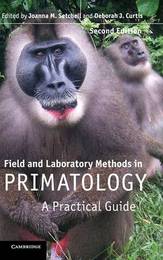
|
Field and Laboratory Methods in Primatology: A Practical Guide
Hardback
Main Details
| Title |
Field and Laboratory Methods in Primatology: A Practical Guide
|
| Authors and Contributors |
Edited by Joanna M. Setchell
|
|
Edited by Deborah J. Curtis
|
| Physical Properties |
| Format:Hardback | | Pages:456 | | Dimensions(mm): Height 229,Width 152 |
|
| Category/Genre | Primates |
|---|
| ISBN/Barcode |
9780521194099
|
| Classifications | Dewey:599.8028 |
|---|
| Audience | | Professional & Vocational | |
|---|
| Edition |
2nd Revised edition
|
| Illustrations |
11 Tables, black and white; 18 Halftones, unspecified; 20 Line drawings, unspecified
|
|
Publishing Details |
| Publisher |
Cambridge University Press
|
| Imprint |
Cambridge University Press
|
| Publication Date |
3 February 2011 |
| Publication Country |
United Kingdom
|
Description
Building on the success of the first edition and bringing together contributions from a range of experts in the field, the second edition of this guide to research on wild primates covers the latest advances in the field, including new information on field experiments and measuring behaviour. It provides essential information and advice on the technical and practical aspects of both field and laboratory methods, covering topics such as ethnoprimatology; remote sensing; GPS and radio-tracking; trapping and handling; dietary ecology; and non-invasive genetics and endocrinology. This integrated approach opens up new opportunities to study the behavioural ecology of some of the most endangered primates and to collect information on previously studied populations. Chapters include methodological techniques; instructions on collecting, processing and preserving samples/data for later analysis; ethical considerations; comparative costs; and further reading, making this an invaluable tool for postgraduate students and researchers in primatology, behavioural ecology and zoology.
Author Biography
Joanna M. Setchell is Senior Lecturer in Evolutionary Anthropology at Durham University, and Director of the MSc in Evolutionary Anthropology. Her research integrates behaviour, morphology and demographic studies with genetics and endocrinology to address questions relating to reproductive strategies, life history and sexual selection in primates. Deborah J. Curtis is Honorary Research Associate in the Department of Anthropology and Geography at Oxford Brookes University. Her interests focus on lemur biology and she has conducted research on functional anatomy, behaviour and ecology, reproductive endocrinology, food chemistry, activity patterns and genetics. She also works as a scientific and medical translator.
Reviews'This is an exceptional and invaluable book for both teaching field and laboratory techniques and for practical use by professional primatologists and behavioral-ecologists, generally. I have used the first edition with great success in methodology courses. This new edition has been updated to include the latest advances in the field and has added materials on field experiments and on measuring behavior. A truly indispensable resource.' Robert W. Sussman, Washington University 'Given the rapid theoretical and technical advances that have occurred in primate field studies, Setchell and Curtis should be required reading for undergraduates seeking to gain experience in observing primates in wild or captive settings, graduates conducting field research, as well as more senior researchers considering the benefits of using new methodologies and approaches to the study of nonhuman primate behavior, ecology, physiology, genetics, and biology. It's the most practical, complete and comprehensive primer available for field researchers. I recommend it highly. The volume is unique in addressing both the 'how to' and 'why' issues in field primatology. It offers a well-written, practical guide for assessing the benefits of using new methodological approaches in field research. Since I intend to take it with me to the field, my only suggestion for improvement is to encourage the publishers to print the volume on waterproof paper!' Paul A. Garber, University of Illinois '... a very important resource and a really useful tool ...' Mammalia
|